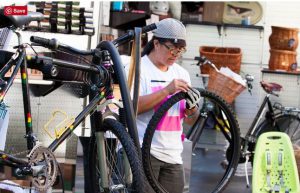. . SUSTAINABLE DEVELOPMENT . .
An article by Matt Hickman for Mother Nature Network (reprinted by permission)
Last week, the always-enviable country of Sweden unveiled yet another forward-thinking maneuver geared to make all other developed nations look positively backwards in comparison. The maneuver in question, crafted by the country’s ruling Social Democrat and Green Party coalition, comes in the form of a parliamentary proposal that would usher in tax breaks that reward Swedes who opt to send off consumer goods such as bicycles, clothing and shoes for minor mending and repairs instead of chucking said items in the trash and replacing them with new ones. This would be achieved by lowering the rate of the value-added tax (VAT) applied to the professional repair of such items from 25 percent to 12 percent.

An additional incentive introduced to Swedish Parliament would offer tax refunds — half the labor cost of repairs — to those who fix bigger ticket items including home appliances such as dishwashers, washing machines and ovens. As noted by the BBC, Swedes can already recoup 50 percent of labor costs of “paid house work” such as employing a handyman or cleaning person from their annual income taxes.
“I believe there is a shift in view in Sweden at the moment. There is an increased knowledge that we need to make our things last longer in order to reduce materials’ consumption,” Per Bolund, the country’s Minister For Financial Markets and Consumer Affairs, explains to The Guardian. “We believe that this [the proposed tax breaks] could substantially lower the cost and so make it more rational economic behaviour to repair your goods.”
Bolund anticipates that by offering generous tax breaks on appliance repairs, more waste-conscious Swedes will be encouraged to fix instead of toss. This, in turn, will foster a thriving repairs industry and create new blue-collar job opportunities for the country’s immigrant population.
“Consumer are quite active in changing both what they buy and how they buy in Sweden, to change the environmental impact, so we see a huge increase in the sale of organic food, and we also see that the interest in the ‘sharing’ economy and the ‘circular’ economy is growing quite rapidly,” Bolund adds to the BBC.
Sweden, unfailingly humble one-upper that it is, has proven itself to be at the top of the game when it comes to planet-bettering schemes such as eliminating its reliance on fossil fuels and recycling, an activity that Swedes are so skilled at that it’s created a national garbage deficit — and for a country that relies on waste-to-energy incinerators to heat homes, that’s not necessarily a good thing. However, the governments of other nations have also embraced the art of repairing as an alternative to sending perfectly fixable items to the landfill.
(Article continued in the right side of the page)
What is the relation between the environment and peace?
(Article continued from the left side of the page)
Take for example France, which, in 2015 passed a law outlawing planned obsolescence and requiring manufacturers to offer consumers free repairs or replacement parts on appliances up to two years after the date of purchase. Like the proposals in Sweden, the French law — Germany and Norway have similar laws on the books, as well — aims to curb the amount of waste entering landfills, keep money in the pockets of hand wringing-prone consumers and generate jobs in the appliance repair sector.
In other countries, the act of repairing in lieu of chucking is less about mandates and 21st century environmental do-goodery and more about upholding ages-old cultural traditions. Take Japan, for example, where broken yet still-valuable ceramics are meticulously mended in a fix-it-centric art form known as kintsugi. After undoing the traditional kintsugi process, shattered bowls and plates and the like are considered more beautiful — and valuable — than they were before the breakage occurred.
Jugaad — a Hindi word that essentially translates to “a hack” — is practiced throughout India. The idea here is to apply ingenious, duct tape-heavy fixes to broken or on-their-way items instead of trashing them.
The Netherlands is the birthplace of the Repair Café Foundation, a popular grassroots nonprofit that promotes community gathering spots where, as the New York Times describes, “neighbors pool their skills and labor for a few hours a month to mend holey clothing and revivify old coffee makers, broken lamps, vacuum cleaners and toasters, as well as at least one electric organ, a washing machine and an orange juice press.” While the movement was borne in Amsterdam and in its infancy remained largely a Dutch phenomenon, repair cafes have appeared in more than 29 countries spread out across every continent.
And then there’s Ireland.
While Dutch-style pop-up repair cafes have also appeared in Irish cities such as Dublin, the Emerald Isle’s greatest contribution to the fix-it movement will forever be Sugru, the putty-like miracle goo that can be used to repair just about everything. And I mean everything. Marketed as the “world’s first mouldable glue,” the idea for Sugru — a riff on sugradh, the Irish word for “play — was developed by Jane Ní Dhulchaointigh, a product designer hailing from Kilkenny. “I wanted to design something that was so easy and so fun to use that more people would consider fixing things again,” Ni Dhulchaointigh recently told the New York Times.
(Thank you to Janet Hudgins, the CPNN reporter who sent us this article.)